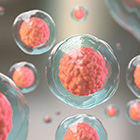A systematic multitechnique approach for detection and characterization of reversible self-association during formulation development of therapeutic antibodies

Reversible, non-covalent self-association presents a risk for long-term stability of proteins. The authors, all of MedImmune, present a comprehensive approach to detecting and characterizing self-association of a therapeutic IgG1 molecule. Dynamic light scattering in a high-throughput, microwell-plate format is suitable for early screening of self-association under many formulation conditions while composition-gradient multi-angle light scattering (CG-MALS) and analytical sedimentation (AUC) are low-throughput techniques that provide in-depth characterization of self-association to identify the stoichiometry and affinity of oligomerization.
Esfandiary, R.; Hayes, D. B.; Parupudi, A.; Casas-Finet, J.; Bai, S.; Samra, H. S.; Shah, A. U.; Sathish, H. A. Journal of Pharmaceutical Sciences 2013, 102, 62-72. DOI: 10.1002/jps.23369

